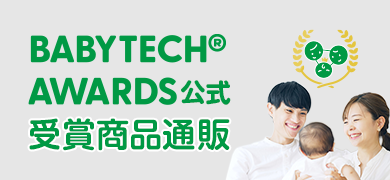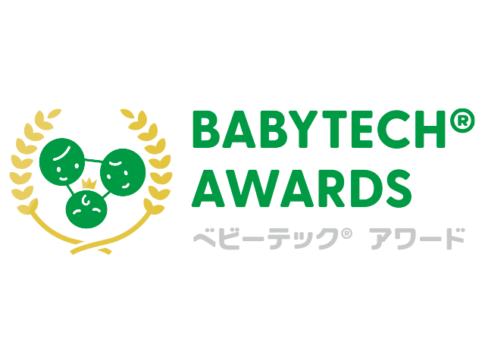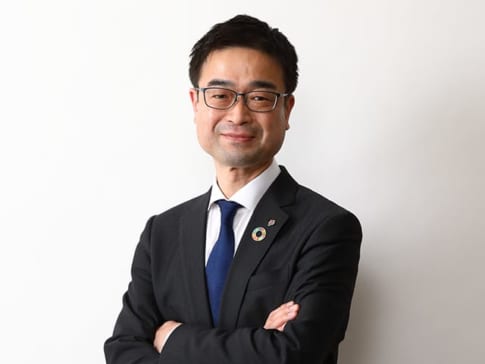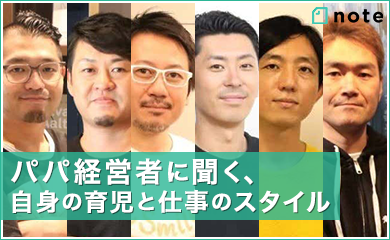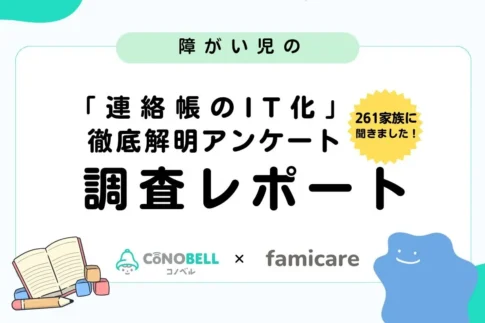AI-based Prediction Detects Predictive Signs of Truancy and Supports Teachers' Awareness and Encouragement of Children
- The following is content from the press release -
(President: Katsuya Uenoyama; hereinafter "PKSHA") announces that its joint venture company, Argonaut Corporation (President: Naganori Sano; hereinafter "Argonaut"), in collaboration with Uchida Yoko Co. (President: Noboru Okubo, hereinafter referred to as "Uchida Yoko") and Toda City, which has been selected as a partner in the "Children's Data Collaboration Demonstration Project (*1)" conducted by the Agency for Children and Families. This project started on a trial basis at a pilot school in Toda City in November 2023, and has been expanded to 18 elementary and junior high schools since December.
Based on the vision of "co-evolution of people and software," the PKSHA Group will expand its knowledge and achievements in AI cultivated in the business domain to solve social issues and accelerate the social implementation of software that will realize a better society.
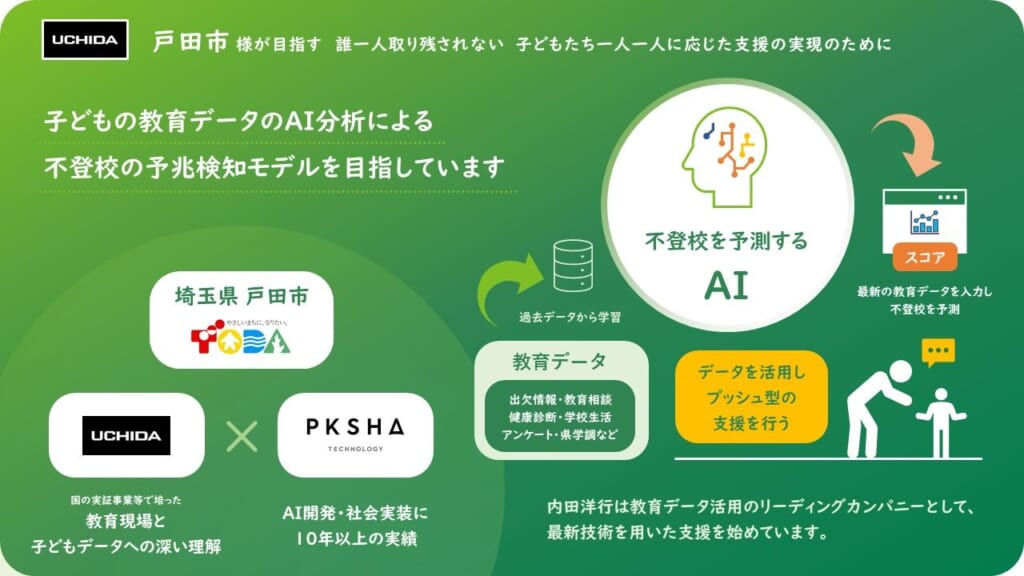
Overview of the Demonstration Study: Centralizing data on children through public-private partnership by leveraging the strengths of local governments, education businesses, and AI to prevent truancy.
PKSHA Group, which has a proven track record in social implementation of AI, will work with Uchida Yoko as a partner in Toda City to conduct highly accurate data analysis based on the situation in the field of education, and to implement AI in the field of education. PKSHA Group, which has experience in social implementation of AI, is working with Uchida Yoko as a partner. The goal is to build a predictive detection model that predicts the likelihood of truancy in the near future and displays it as a risk score. In order to construct the actual model for detecting predictive signs, we are incorporating the opinions of experts in the field of education through hearings, and using data registered in the school administration support system, such as "attendance, tardiness, and early dismissal status" and "health room usage," as well as data from the Saitama Prefecture School Achievement and Learning Status Survey (academic achievement survey and questionnaire survey), "school life-related questionnaires," "use of educational counseling," and "school life-related questionnaires," and "school life-related questionnaires. Questionnaire Survey", "Educational Counseling", "School Health Examination Results", etc.
In cooperation with Uchida Yoko, we will proceed with the design and construction of AI algorithms through the use of the PKSHA algorithm module (*2), which constitutes the AI fraud detection system "PKSHA Security" and others. By displaying the data items that form the basis of the algorithm along with risk scores, we are considering linking this to specific support activities by teachers and staff at school sites.
Image of PKSHA Algorithm Module Utilization
In the data analysis phase, in which PKSHA Group's Argonaut takes the lead, we build a model to detect predictive signs in three steps: 1) selection of data items, 2) construction of a model, and 3) validation of the model. By aggregating and analyzing multiple data while protecting personal information, we visualize the risks and the underlying items in order of importance, and by providing explanations for the AI's predictive results, we support the judgment and actions of faculty and staff, aiming to solve essential problems.
Furthermore, through the improvement of AI algorithms based on new insights from faculty members, we aim to realize a model in which people and software evolve together.

Consolidation, analysis, and utilization of data with consideration for personal information
In addition to linking the various data Toda City holds on children in accordance with the Act on the Protection of Personal Information, Toda City will work on this in compliance with the "Guidelines for the Utilization of Education Data" formulated independently by Toda City in December 2022, and will utilize the database while providing careful explanations to students and their parents/guardians. The data will be used in a manner that guarantees the security of individuals, including the following.
Background of development: Establishment of a system to detect signs of deep-seated issues surrounding children
In recent years, problems surrounding children such as child abuse, bullying, truancy, and young caregivers have become more serious, and there are many cases that cannot be solved only by setting up a consultation service. One of the solutions to this problem is to use AI. As one solution to this problem, AI-based predictive detection models are attracting attention as a possible means of providing push-type support.
The Toda City Board of Education has focused on improving the ICT environment in schools, including the introduction of learner terminals from an early stage before the GIGA School concept. In addition, in collaboration with about 100 companies, NPOs, universities, and research institutions, the Toda City Board of Education is working on advanced educational reforms, including the promotion of programming education and digital citizenship education, support for truancy, and enhancement of inclusive education. In the area of children's data collaboration, we were selected for the Digital Agency's "Demonstration Project for Support through Collaboration of Various Types of Data on Children," which began in FY2022. The project aims to develop a comprehensive database for education by linking and visualizing data on education, childcare, welfare, medical care, etc. held by schools, boards of education, and local governments by department, while taking into consideration the protection of personal information and ethical aspects. We have a vision of "realizing education in which no one is left behind".
Future Prospects: Improving the environment for watching over children through the use of data and AI, and accelerating the use of AI technology for social issues.
By continuing to make predictions over the long term, we will work to improve the accuracy of the model for detecting signs of non-attendance by using multi-year data, expanding data items, and using fresh data such as daily questionnaires. In the future, we are considering working on the detection of SOS such as bullying.
Through this demonstration research, the PKSHA algorithm module, which was designed based on knowledge of social implementation of AI, will be utilized in support AI in the field of education to create an environment in which teachers and staff can watch over each and every child, and to realize a model that can be used by local governments nationwide.
Utilization of PKSHA Algorithm Module to Solve Social Issues
The PKSHA Group is actively engaged in research, development, and social implementation of the PKSHA Algorithm Module in order to link its application areas from the business domain to the benefit of people in their daily lives. In addition to this initiative, research and implementation are underway in areas such as learning support in the education field, isolation support, and visualization of social voices using interactive AI. By advancing research while paying sufficient attention to the privacy of each individual consumer and ensuring security, we aim to realize a better society through future software by actively utilizing AI in the context of social good support.
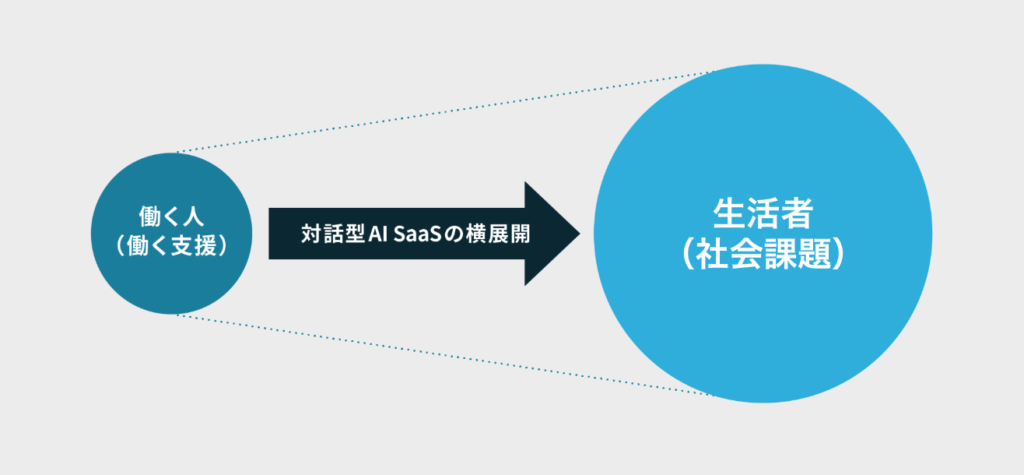
*1 "Children's Data Linkage Demonstration Project" https://www.cfa.go.jp/policies/kodomo-data/
2 PKSHA Algorithm Module: A collection of algorithms developed by PKSHA Research, which conducts research and development for the PKSHA Group and constitutes the company's AI SaaS/Solution.
Noboru Okubo, President and Representative Director of Uchida Yoko commented
Uchida Yoko sincerely welcomes the demonstration research with PKSHA Group for the development of a predictive model for truancy using AI technology, and hopes that AI analysis will display data items that can serve as evidence and provide various boosting supports to schools and teaching staff. Together with the PKSHA Group, we at Uchida Yoko will continue to build a system that enables the correct and safe use of educational data for children, and contribute to the creation of an affluent society through cutting-edge technology.
About Toda City
Organization: Toda City, Saitama Prefecture
Representative: Fumihito Sugawara, Mayor
URL: https://www.city.toda.saitama.jp/
About Uchida Yoko
Company name: Uchida Yoko Co.
Head office: 4-7, Shinkawa 2-chome, Chuo-ku, Tokyo
Representative: Noboru Okubo, President and Representative Director
URL: https://www.uchida.co.jp/
About AlgoNaut
AlgoNaut is a joint venture company established by Tokio Marine Holdings and PKSHA Technology to maximize the management resources of both companies. AlgoNaut plans and develops solution businesses that address risks surrounding customers and society by using risk data and risk prevention know-how accumulated by the Tokio Marine Group companies and algorithms developed by PKSHA in the machine learning and deep learning domains.
Company name: AlgoNaut, Inc.
Representative: Naganori Sano, Representative Director
Location: Hongo Segawa Building 4F, 2-35-10 Hongo, Bunkyo-ku, Tokyo
URL: https://www.algonaut.co.jp/
Product Page
https://apple.co/3xhokkA
About PKSHA Technology
With the mission of "giving shape to the software of the future," we develop AI solutions and provide AI SaaS using machine learning and deep learning algorithms developed in-house to create future relationships between companies and people. We provide solutions tailored to our clients' issues based on a wide range of technologies, including automatic response using natural language processing, image/video recognition, and predictive modeling, as well as AI SaaS that solves common problems. We aim to create an affluent society where people and software evolve together.
Company name: PKSHA Technology Inc.
Location: Hongo Segawa Building 4F, 2-35-10 Hongo, Bunkyo-ku, Tokyo
Representative: Katsuya Uenoyama, Representative Director
URL: https://www.pkshatech.com/



